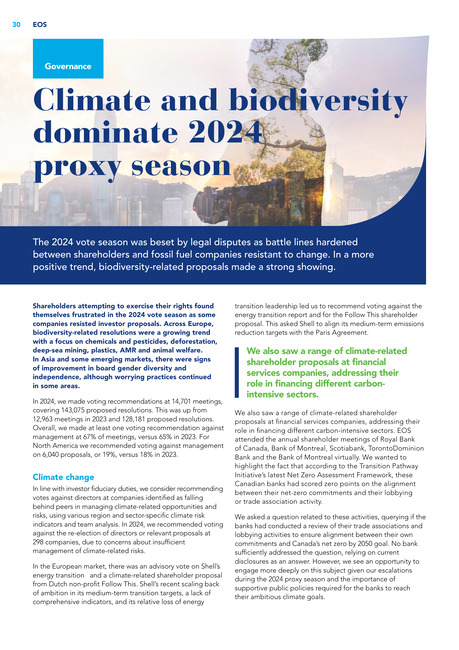annual review indst 2024 public - Flipbook - Side 32

32
EOS
At Nasdaq and TSX-listed companies, we also opposed
responsible directors where executive teams fell short of at
least 30% representation of women or the minority gender,
including those who identify as non-binary.
In developed Asia and emerging markets we still came across
instances of all-male boards that gave cause for concern, given
the more diverse board perspectives increasingly being
acquired by peers. At Power Grid Corp of India, we
recommended voting against the election of a new male nonindependent director, in the absence of nomination committee
members or the board chair being up for election. At Grupo
México, which has historically maintained an all-male board, the
company continued to bundle the director elections and failed
to disclose information on candidates prior to the AGM, which
led us to recommend voting against the slate of directors.
For 2024, we tightened our board gender diversity criteria
to 15% in Japan and South Korea. This was to signal our
minimum expectation of around two female directors and in
anticipation that companies achieve the long-term ambition
of 30% women on boards by 2030. This resulted in more
recommendations of votes against for board gender
diversity in both markets. We recommended voting against
the longest tenured independent director at Posco, and
against the presidents of Keyence, SoftBank and Omron.
We observed progress in the appointment of mostly
outsider female directors in Japan due to the government
target and increasing investor pressure, but there is still a
lack of female executive directors.
In general, it was positive to see that all-male boards in Hong
Kong were becoming rare, as companies listed on the Hong
Kong stock exchange needed to have at least one female
board director by the end of 2024.
Executive pay, auditor tenure and governance
We continued to see excessive CEO pay, excessive auditor
tenure, and questionable governance structures in various
sectors and markets. For example, several US healthcare and
services companies such as HCA Healthcare and Tenet
Healthcare awarded excessive pay packages, despite issues
with staff retention in the sector. We pressed them to
consider how this would impact workforce perceptions, and
said that investing in human capital would drive better longterm value for shareholders.
This year, biodiversity made a
strong showing via resolutions
on plastic pollution, deep sea
mining, deforestation, pesticide
use, microfibre pollution,
antimicrobial resistance (AMR)
and animal welfare.
We recommended voting against the pay packages at
several North American oil and gas companies, including
Exxon, Canadian Natural Resources, Suncor, Chevron, and
Cheniere Energy due to the high quantum and other
structural concerns. In addition, we opposed the pay award
at aircraft manufacturer Boeing, due to concerns relating to
the level of quantum and a lack of downward discretion
applied despite several serious safety issues.
At TotalEnergies, we recommended voting against the
re-election of the lead independent director, Jacques
Aschenbroich, due to concerns around shareholder rights.
We understood that the board had refused to allow a
shareholder resolution onto the ballot from the Ethos
Foundation regarding the separation of the chair and CEO
roles, both held by Patrick Pouyanné. We had engaged
with the company’s head of corporate and securities law
on the process that the board followed before
dismissing the shareholder resolution. While we received
assurance that the lead independent director had
consulted with board members without the influence of
the chair/CEO, we were concerned that the board stated
that it would no longer accept advisory shareholder
resolutions on to the ballot. We consider this to be
an erosion of shareholder rights.
We continued to recommend votes against the audit
committee chair and the ratification of the external auditor
where the audit firm had been in place consecutively for













